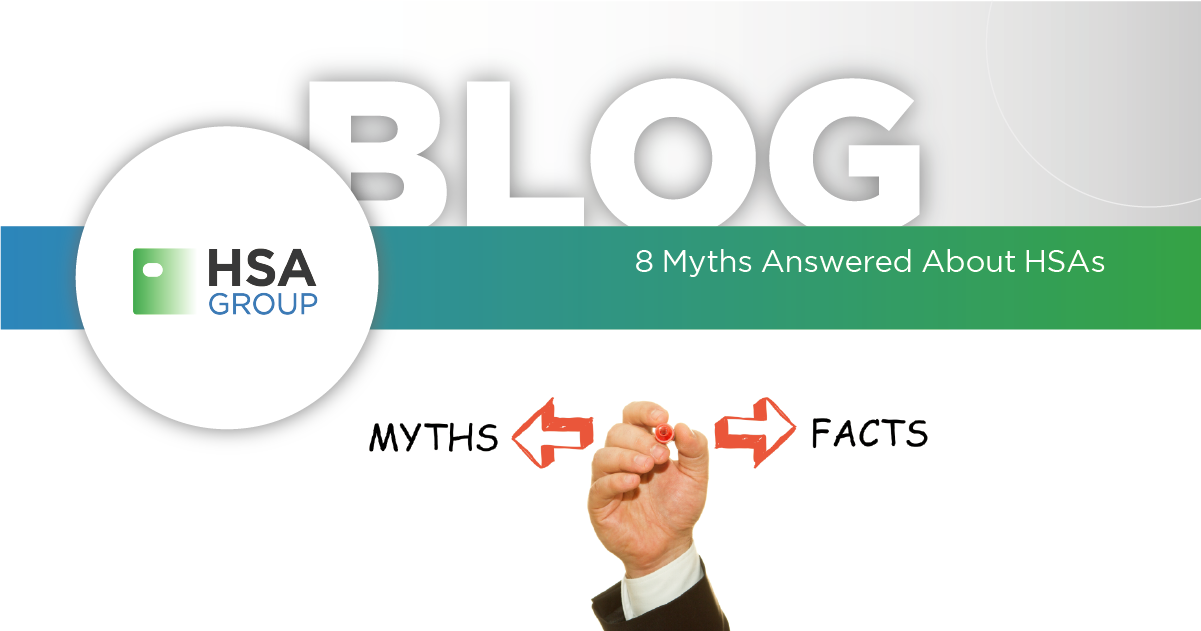In recent years, the number of HSAs has increased dramatically. Despite this increase, certain persisting myths about HSAs have caused some consumers to delay creating an account and thereby missing out on the benefits that HSAs offer.
Choosing a health plan for yourself and your employee base for the year is not an activity that should be done in haste. You need to research the best options for your team. One option may be a high-deductible plan that makes you eligible to contribute to a health savings account. Weigh this option carefully. There are a lot of misconceptions about how Health Spending Accounts (HSAs) work. The biggest reason HSAs are on the rise is their double-win as it pertains to taxes. HSA contributions are not taxed and the allocation to each employee can be used tax-free for eligible medical expenses at any time. This includes you as an employee of your own firm. To alleviate some myths about HSAs the HSA Group has compiled 8 myths about HSAs and have busted them wide open to assist your decision to add or replace HSAs into your benefit plan options.
Myth #1: Use it or lose it.
One of the biggest myths about HSAs is that you must use 100% of your allocated funds by year-end or you lose them. Some HSAs are definitely set up this way based on employer by employer situations. However, the majority of employers roll over unused funds from the current year into the next year. If the employer uses the rollover plan when they set up the employee HSA plan, then unused funds get added to new funds increasing the spend threshold in the next year. Using this scenario, let’s say an HSA has allocated funds for 2021 of $1500 but only $900 was used in 2021. Then, in 2022 the employee could make use of $2100 in health spend benefits. This rollover can be extended to the next year only. At the end of the second plan year, any unused portions from the first plan year are forfeited. Funds not used by the employee are returned to the employer.
Myth #2: HSAs, WSAs and are all the same.
While all similar in nature, Health Spending Accounts, Wellness Spending Accounts, and Flexible Spending Accounts are different in many ways – particularly as it pertains to tax ramifications. This confusion between the acronyms and their benefits has led to one of the most common myths about HSAs. They are all similar and they are 3-letter acronyms that thrown around synonymously. We have covered previously in great detail what HSAs are and what WSAs are. No need to use this blog to rehash most of that information. But at the highest level here are the main differences:
HSA tax free health benefit to be used for over 150 different CRA-approved HSA expenses such as medical expenses, dental, medicine or even top-up an existing benefits plan that only covers 80% of an expense for example.
WSA is a taxable benefit provided by the Employer on a wide array of lifestyle or wellness related expenses ranging from gym memberships to nutrition to professional development and beyond
FSA is sort of a catch-everything pool of benefit funds that includes both HSA and WSA expense benefits. The health-related expenses remain tax-free and the wellness expenses become a taxable income. For the employee, they simply have a flexible pool of allocated funds to use as their situation dictates. [It is important to note that unlike in the United States, FSAs in Canada can only be funded by an employer.]
Myth #3: An Employee’s HSA/WSA can only be used by the Employee
Nope. We are extremely happy to bust this from the many myths about HSAs. Dependents are most assuredly eligible to share Employee allocated fund limits. However, they need to be set up as dependents on the Employee’s benefits plan and must fall under the following requirements:
- Claimed as dependents on your personal tax return
- Legal spouse (married or not)
- Natural, adopted or step-children (under the age of 21 or under 25 if full-time student)
Myth #4: The Employer manages the funds so they see all transactions
This is 100% false. The Employee has full access to view balances, transactions, and past spend. The Employer can only see balances and transaction amounts. They never have view of what the transaction amounts were actually used for. The Employee’s privacy of health is always 100% maintained. The Employer’s interests of anti-fraud are protected through the Plan facilitator adjudicating claims.
Myth #5: Employees need a medical checkup prior to receiving an HSA/WSA
There is no medical checkup needed for an Employee to receive or use HSA or WSA benefits. They are NOT benefit insurance plans. Simply put, they are a tax-efficient way for the Employer to provide health and wellness related perks to their Employees (and to themselves). Even if you or your Employees have pre-existing conditions, the funds allocated can be flexibly used however the recipient wishes to use them.
Myth #6: If you Have an HSA you don’t need health insurance
We are (of course) biased to the benefits of an HSA over a traditional plan and the fact that an HSA provides the greatest amount of flexibility for the recipient to use allocated funds as they wish. However, this does not mean benefits insurance plans are not a good idea in certain scenarios for an Employer. Or, to supplement situational scenarios such as travel, emergency medical, or emergency drug to name a few. Tradition plans provide health coverage for pre-established buckets of expenses such as prescription, medical, dental, etc. Many health expenses can be extremely costly. Having a group benefits plan is an insurance for when those unexpected aspects of life hit your home. HSAs have fixed amounts whereas a group benefits plan has much larger upward limits. But, when used in tandem, an Employee can get the best of both worlds. As an example, maybe they need a dental procedure for $2000 that their group plan only covers 80% of. Group plan will cover $1600 leaving $400 for your Employee to pay. If they also have an HSA, the Employee can allocate the $400 to their HSA and never be out pocket for the entire $2000 expense.
Myth #7: The Employer can only claim the allocated funds as a deduction for taxes
In almost all cases, the Employer can claim the full amount of allocated HSA funds for all Employees plus the administrative costs to the HSA provider for managing the HSA accounts. As an example, if the Employer has 20 Employees and opts to provide $1500 HSA to each of them, and the administrative fees was 10%, the Employer could claim (20 x $1500) = $30,000 plus 10% = $33,000 as a business expense (Ensure you consult with CRA for all business tax related questions – HSA or otherwise).
Myth #8: HSAs/WSAs are only for healthy people.
Nothing could be further from the truth and as myths about HSAs go, this one is the easiest to respond to. HSAs/WSAs offer all Employees access to health and wellness funds to be used as they see fit. Whether or not the employer also provides a group benefits plan or not, these funds can be used for what is important to Employee at whatever stage of life and/or work they are at. To the individual employee that uses the full allocated amount to purchase prescriptions for their family due to health situations, this could mean they never have to make the hard decision between prescriptions and food on the table. That is a massive benefit to that Employee. To the ‘healthier’ Employee that can use their allocated funds for a gym membership, this is equally a massive benefit as they don’t have to shell out of packet for a lifestyle they strive for. Although these two scenarios are vastly different, the two Employees both see the value in the benefit their Employer provided and are appreciative of it. Their engagement and satisfaction with their Employer grows which in turn reduces their likelihood of leaving for “greener grass.”
Your Health and Wellness Insights
At the end of the day, when choosing an employee benefits plan for your business and Employees, make sure you know the facts. Above we tackled a number of truths about HSAs and busted open a few myths about HSAs to assist you in making your decision easier. Ensure you know the truths versus the myths. If you need assistance in deciding how an HSA could benefit your business, contact HSA and book a demo today.




